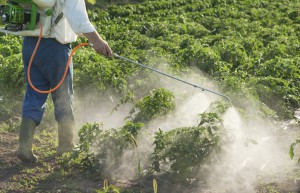"Inert" ingredients in pesticides increase their toxicity to humans
 French researchers recently published a study showing that major pesticides are more toxic to humans than suggested by their active ingredients. In addition to declared active ingredients, pesticides contain a mix of other ingredients deemed “inert,” which are often kept confidential by the manufacturing companies. When pesticides are tested for safety, the trials do not take these other chemicals into account, and the active ingredients are tested in isolation. However, some “inert” ingredients may magnify the overall toxicity of the pesticides by enhancing the ability of the active chemicals to penetrate cells. This research looked at the toxicity of herbicides, fungicides, and insecticides when all ingredients were included in the testing, and found that eight out of nine pesticide formulations were up to one thousand times more toxic than their active ingredients. Roundup was an example of a pesticide that showed high toxicity. “Despite its relatively benign reputation, Roundup was among the most toxic herbicides and insecticides tested,” wrote the study authors. Tests of pesticide toxicity need to take into account the full cocktail of ingredients, because even exposure to low levels of residue may be more dangerous than previously thought.
French researchers recently published a study showing that major pesticides are more toxic to humans than suggested by their active ingredients. In addition to declared active ingredients, pesticides contain a mix of other ingredients deemed “inert,” which are often kept confidential by the manufacturing companies. When pesticides are tested for safety, the trials do not take these other chemicals into account, and the active ingredients are tested in isolation. However, some “inert” ingredients may magnify the overall toxicity of the pesticides by enhancing the ability of the active chemicals to penetrate cells. This research looked at the toxicity of herbicides, fungicides, and insecticides when all ingredients were included in the testing, and found that eight out of nine pesticide formulations were up to one thousand times more toxic than their active ingredients. Roundup was an example of a pesticide that showed high toxicity. “Despite its relatively benign reputation, Roundup was among the most toxic herbicides and insecticides tested,” wrote the study authors. Tests of pesticide toxicity need to take into account the full cocktail of ingredients, because even exposure to low levels of residue may be more dangerous than previously thought.



